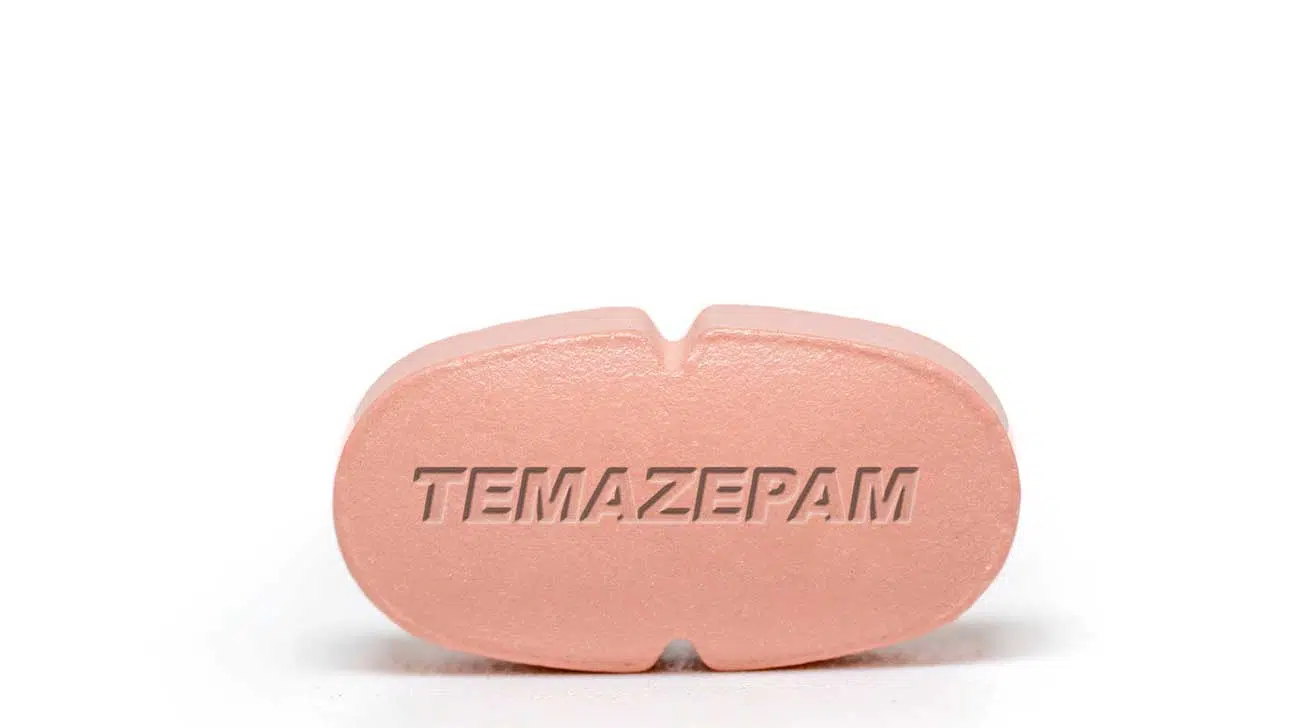
Restoril is the brand name for a drug called temazepam, a benzodiazepine drug that is typically prescribed as a short-term insomnia treatment.
Restoril is only recommended for short-term use. Taking Restoril longer than intended may put a person at risk for physical and psychological addiction and dependence.
For these reasons, temazepam is a controlled substance, like other benzodiazepines.
Why Restoril Is A Schedule IV Controlled Substance
Restoril has been labeled as a Schedule IV drug by the Drug Enforcement Administration (DEA).
Schedule IV drugs are defined as drugs with a low potential for abuse and low risk of dependence.
While Restoril addiction is rare, it does occur particularly among people who are using the drug without a prescription from a healthcare provider.
What Drug Class Is Restoril?
Restoril is a sedative-hypnotic and central nervous system depressant. When ingested, Restoril has a sleep-inducing effect by slowing activity in the brain.
This drug works by enhancing the activity of a neurotransmitter called gamma-aminobutyric acid (GABA). GABA transmitters block certain impulses in regions of the brain, thus creating a sedative effect.
Is Restoril Considered A Narcotic?
Narcotics are drugs that tend to dull senses and relieve pain. Today, the term “narcotic” typically refers to substances such as opioids and their semi-synthetic substitutes.
Under this definition, Restoril is not a narcotic. Examples of narcotics include pharmaceutical drugs such as oxycodone (OxyContin), hydrocodone (Vicodin), codeine, tramadol, methadone, buprenorphine, and fentanyl.
What’s The Difference Between Xanax And Restoril?
Both Restoril and Xanax (alprazolam) are benzodiazepine drugs that treat insomnia, generalized anxiety disorder, and panic disorder.
Basic differences between these medications include chemical structure, elimination half-life, and approved medical uses.
Many healthcare professionals agree that temazepam may have a greater abuse potential than Xanax, but there’s no strong evidence of substantial difference in addiction among people who use these drugs.
How Common Is Restoril Abuse?
When someone abuses Restoril, it doesn’t necessarily mean they’re addicted to the drug. Over time, however, Restoril misuse can develop into a psychological and physical addiction.
People who become addicted to Restoril may also experience physical dependence, which means they’ll experience Restoril withdrawal symptoms if they suddenly stop taking the drug.
Dangers Of Misusing Restoril
There are several side effects and dangers associated with Restoril use that will only be exacerbated when the drug is not taken as directed.
Potentially serious side effects of Restoril abuse include:
- memory problems
- drowsiness
- confusion
- slurred speech
- sleepwalking or sleepiness
- mood swings
- fatigue
- low blood pressure
- respiratory depression and other breathing problems
- coma
- allergic reactions
- overdose death and other adverse effects
People who combine Restoril with substances such as alcohol, diazepam, zolpidem, lorazepam, midazolam, or hydromorphone put themselves at a much higher risk for life-threatening Restoril drug interactions.
Other types of drugs that may cause adverse effects if taken alongside a dose of temazepam include barbiturates, antihistamines, antidepressants, and some over-the-counter supplements.
Find A Drug Abuse Recovery Program Today
Call our helpline today for more information on substance use disorders and treatment options for people who abuse prescription drugs such as temazepam.
Our team will help you or your loved one achieve sobriety.
Addiction Resource aims to provide only the most current, accurate information in regards to addiction and addiction treatment, which means we only reference the most credible sources available.
These include peer-reviewed journals, government entities and academic institutions, and leaders in addiction healthcare and advocacy. Learn more about how we safeguard our content by viewing our editorial policy.
- National Institute of Health (NIH)
https://pubmed.ncbi.nlm.nih.gov/6108299/ - National Institute of Health (NIH)
https://pubmed.ncbi.nlm.nih.gov/6121626/ - U.S. Food and Drug Administration (FDA)
https://www.accessdata.fda.gov/drugsatfda_docs/label/2016/018163s064lbl.pdf - U.S. Food and Drug Administration (FDA)
https://www.accessdata.fda.gov/drugsatfda_docs/label/2021/018163s067lbl.pdf


